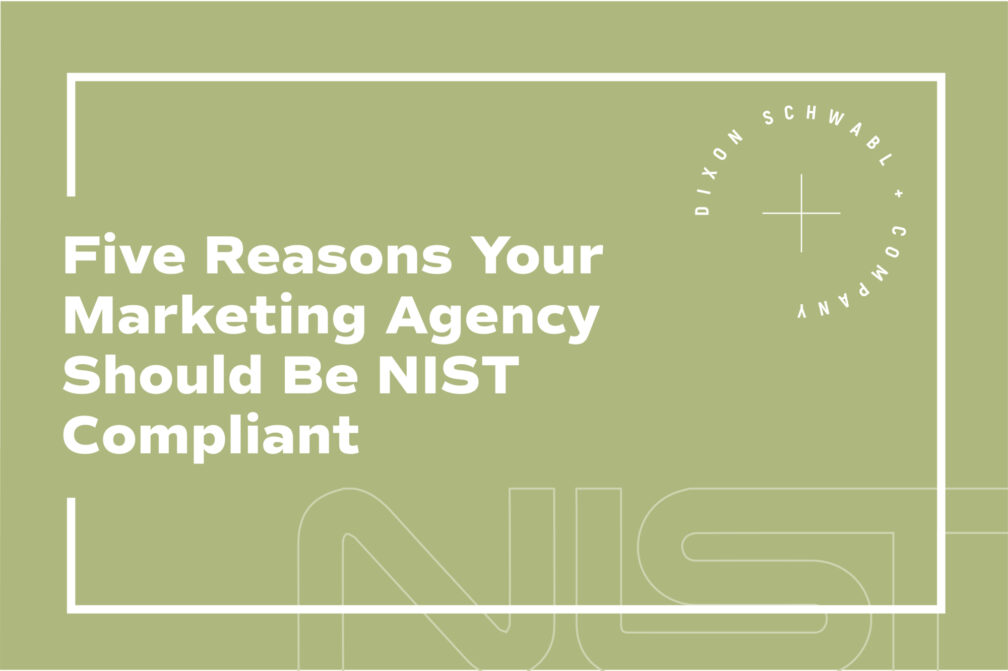Blog
Business Intelligence

5 reasons your marketing agency should be NIST compliant
I bet you’ve never asked your current marketing agency: “Are you NIST compliant?”
Doesn’t quite roll off the tongue as easily as “What experience do you have with companies in our space?”
I recommend you do now. Why? Well, before we get to why, let’s talk about what NIST stands for and what NIST compliance means.
NIST stands for the National Institute of Standards and Technology. NIST compliance means an organization has taken the necessary steps (which Dixon Schwabl + Company has) to secure its data and network, strengthening its protection against cyber threats.
So sure, it strengthens our protection. But what about yours? Let’s get to the five reasons why your marketing agency should be NIST compliant.
Stewards of your data:
Sirius Decisions reports that a strong organization can generate nearly 70% more revenue purely on the quality of its data. If your marketing agency is NIST compliant, it’s committed to being a good steward of your data and information—and protecting digital data is central to the success of your business.
Data is a challenge for marketers:
Salesforce’s 2021 State of Marketing reports that only 42% of marketers are completely satisfied with the quality and hygiene of their customer data. And only 33% are completely satisfied with their ability to use data to create better customer experiences. You need a partner who provides ongoing maintenance to ensure your database is updated, paving the way for proper customer segmentation and personalized customer journeys.
Speaking of the journey:
Your customers’ “known” journey starts when they provide proper consent. Part of the Salesforce report states only 37% of marketers are content with their consent management. When working with a partner who values data and data security, you’re working with a partner who values your customers and their experience, too. It’s simply not right to spam people with your content. You need their consent before that personalized journey happens. Which reminds me: How do you feel about your current journey with DS+CO? You can always update your consent and preferences with us here.
First-party data:
We’ve talked about the impending block of third-party cookies quite a bit on our blog. Yes, Google has delayed this until next year, but that won’t change the long-term game that your first-party data is your most valuable asset as a marketer. It’s unique to your business, your customers and their customer experience. Apple’s current iOS gives people an easy way to opt out of apps that track them for ad purposes. And this trend will only continue, which means the challenge to you as marketers is to create content so good your audience wants to opt-in and even wants the ads you’re serving them. It starts with good first-party data.
What if
What if your business is impacted by a cyberattack? You need to work with someone who understands how to communicate with your employees and key stakeholders. That’s why Dixon Schwabl has partnered with Harris Beach Attorneys at Law, LMT Technology Solutions and Caetra.io on a cybersecurity incident response as a service program that proactively prepares companies for potential cyberattacks.
So next time you’re meeting with your marketing agency, ask them the usual questions—but throw in one about NIST. Data is at the forefront of marketers’ minds, and good data is simply good business.

Jon Alhart
Jon unites people and resources, piecing together the full marketing puzzle to drive impact in emerging digital spaces. He’s a graduate of Ithaca College and is certified in Advanced Google Analytics, HubSpot Inbound Marketing, Google Ads Search and Marketo. And he wraps all of that in 20+ years of nonprofit, sports, events, financial services, healthcare, retail and telecom experience. Including giving his time to Baden Street Settlement.